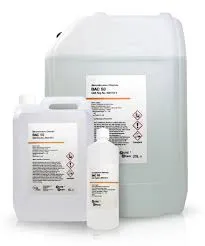water flocculation chemicals
Flocculation in Water Treatment The Role of Chemicals
Flocculation is a vital process in water treatment, where small particles are agglomerated into larger clusters or flocs that can be easily removed from water. This process is crucial for ensuring that drinking water is safe and clean, as well as for treating wastewater to minimize environmental impact. The use of flocculation chemicals is at the core of this process, and understanding their role can significantly enhance the efficiency of water treatment systems.
At its core, flocculation involves the addition of chemicals, often referred to as flocculants, to water containing suspended solids. These flocculants work by neutralizing the electrostatic charges on particles, which prevents them from repelling each other. As a result, the particles start to come together, forming larger aggregates that can settle out of the water more easily. Common flocculating agents include aluminum sulfate (alum), iron(III) chloride, and various organic polymers. Each of these flocculants has distinct properties and mechanisms of action, making them suitable for different types of water treatment applications.
Aluminum sulfate, one of the most widely used flocculants, operates by hydrolyzing in water to form aluminum hydroxide, which captures suspended particles. It is particularly effective in removing turbidity caused by clay and silt in surface waters. On the other hand, iron(III) chloride is effective in a broader pH range and can bind more effectively with organic matter, proving useful in both municipal and industrial wastewater treatment.
Organic polymers, known as synthetic flocculants, present another dimension of flocculation chemistry. These polymers can be tailored to interact with specific types of particles, making them highly effective in diverse applications—from mining to municipal water treatment. They enhance the settling characteristics of the flocs, reducing the volume of sludge generated and optimizing the efficiency of the filtration process.
water flocculation chemicals

The choice of flocculation chemicals depends on various factors, including the characteristics of the water being treated, the types of contaminants present, and the desired outcomes. For instance, water with high organic content may require a different approach compared to water laden with inorganic particulates. Moreover, some flocculants may require pre-treatment processes to enhance their effectiveness, such as adjusting the pH of the water or pre-coagulating the particles.
While flocculation plays a crucial role in optimizing water purification, it is essential to consider the potential environmental and health impacts of the flocculants used. Chemicals such as aluminum sulfate can leave residuals in treated water, which raises concerns about long-term exposure and regulatory compliance. As such, the water treatment industry is increasingly looking toward environmentally friendly alternatives and biodegradable polymers that achieve similar results without the drawbacks associated with traditional flocculants.
Additionally, the growing trend of water scarcity and the need for sustainable practices push researchers to explore innovative flocculation technologies. Techniques such as electrocoagulation and biological flocculation are emerging as potential solutions that can enhance the efficiency of existing processes while being less reliant on chemicals.
In conclusion, flocculation is a fundamental process in water treatment that relies heavily on chemicals to facilitate the removal of particulate matter. Understanding the various flocculants and their mechanisms not only enhances water quality but also informs best practices in water management. As industries and municipalities strive for greater sustainability, the ongoing research into safer, more effective flocculation technologies will play a critical role in the future of water treatment.
-
Understanding Polycarboxylic Acids: Properties, Applications, and Future PotentialNewsJul.28,2025
-
Scale Inhibitor Explained: How to Protect Your System from Limescale and Hard Water DamageNewsJul.28,2025
-
Scale and Corrosion Inhibitors: Essential Chemicals for Industrial Water System ProtectionNewsJul.28,2025
-
Polyaspartic Acid: A Biodegradable Polymer for Sustainable ChemistryNewsJul.28,2025
-
Isothiazolinones: A Versatile Antimicrobial Class with Industrial Power and Regulatory ChallengesNewsJul.28,2025
-
A Deep Dive into 2-Phosphonobutane-1,2,4-Tricarboxylic Acid (PBTC)NewsJul.28,2025





